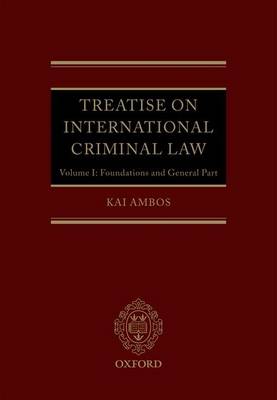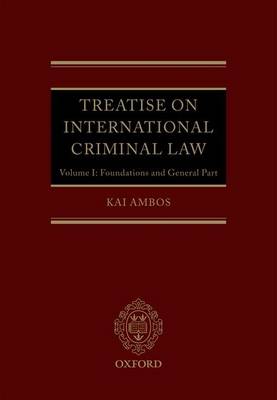
- Retrait gratuit dans votre magasin Club
- 7.000.000 titres dans notre catalogue
- Payer en toute sécurité
- Toujours un magasin près de chez vous
- Retrait gratuit dans votre magasin Club
- 7.000.000 titres dans notre catalogue
- Payer en toute sécurité
- Toujours un magasin près de chez vous
Treatise on International Criminal Law, Volume 1
Foundations and General Part
Kai Ambos
Livre relié | Anglais
206,45 €
+ 412 points
Description
Since the adoption of the Rome Statute of the International Criminal Court in 1998, international criminal law has rapidly grown in importance. This three-volume Treatise on International Criminal Law presents a foundational, systematic, consistent and comprehensive analysis of international criminal law. Taking into account the scholarly literature, not only sources written in English but also in French, German, Italian, Portuguese, and Spanish, the book draws on the author's extensive academic and practical work in international criminal law. This first volume addresses the foundations of international criminal law and the emerging general principles. It examines the history of the discipline and the concepts behind it. Looking at the sources of international criminal law, the book then moves to investigate the general structure of crime in international criminal law, and to address in detail the role played by the concept of individual criminal responsibility. The subjective requirements of criminal responsibility are examined, and also those defences that exclude such responsibility. The full three-volume treatise will address the entirety of international criminal law, re-stating and re-examining the fundamental principles upon which it rests, the manner it is enacted, and the key issues that are shaping its future. It will be essential reading for practitioners, scholars, and students of international criminal law alike.
Spécifications
Parties prenantes
- Auteur(s) :
- Editeur:
Contenu
- Nombre de pages :
- 520
- Langue:
- Anglais
Caractéristiques
- EAN:
- 9780199657926
- Date de parution :
- 14-03-13
- Format:
- Livre relié
- Format numérique:
- Ongenaaid / garenloos gebonden
- Dimensions :
- 178 mm x 246 mm
- Poids :
- 1020 g







